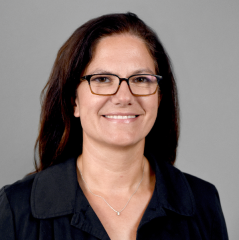Melanie Gall
Downtown Phoenix
Melanie Gall is a hazards geographer studying the interaction between natural hazards and society. She co-directs the ASU Center for Emergency Management and Homeland Security and manages the Spatial Hazard Events and Losses Database for the United States (SHELDUS). Her expertise lies in risk metrics (e.g., disaster losses, indices, risk assessments), hazard mitigation and climate change adaptation planning as well as environmental modeling. The applied nature of hazards research allows her to work closely with emergency management agencies from local to federal levels. She has conducted post-disaster field work in Mozambique, Haiti, New Jersey, Louisiana, Mississippi, and South Carolina. Her publications appeared in journals such as Nature Climate Change, Bulletin of the American Meteorological Society, and Natural Hazards Review.
PhD, Geography, University of South Carolina, 2007
MS, Geography and Geoinformatics, University of Salzburg (Austria), 2002
BS, Geography (Biology and Political Sciences), University of Heidelberg (Germany), 1999
Certified Floodplain Manager (CFM), 2012
Gall, M. and Carol J. Friedland. 2020. If Mitigation Saves $6 Per Every $1 Spent, Then Why Are We Not Investing More? A Louisiana Perspective on a National Issue. Natural Hazards Review 21(1). https://doi.org/10.1061/(ASCE)NH.1527-6996.0000342
de Sherbinin, A., A. Bukvic, G. Rohat, M. Gall, B. McCusker, B. Preston, A. Apotsos, C. Fish, S. Kienberger, P. Muhonda, O. Wilhelmi, D. Macharia, W. Shubert, R. Sliuzas, B. Tomaszewski, and S. Zhang. 2019. Climate change vulnerability mapping: a systematic review and recommendations for the future. WIREs Climate Change. https://doi.org/10.1002/wcc.600
Gall, M. 2019. Loss reduction and sustainability. In: From Disaster to Catastrophe: U.S. Emergency Management in the 21st Century, edited by C. Rubin and S.L. Cutter. Routledge.
Gall, M. and S. L. Cutter. 2019. 2005 Events and Outcomes: Beyond Hurricane Katrina. In: Emergency Management: The American Experience 1900-2010 (3rd ed.), edited by C. B. Rubin. Fairfax, VA: CRC, 191-217.
Cutter, S.L., Emrich, C.T., M. Gall, and R. Reeves. 2018. Flash flood risk and the paradox of urban development. Natural Hazards Review 19(1): online.
Gall, M. 2017. Direct and Insured Flood Damage in the United States. In: Flood Damage Survey and Assessment: New Insights from Research and Practice, edited by D. Molinari, S. Menoni, and F. Ballio. American Geophysical Union and Wiley: Washington, DC: 53-64.
Cutter, S. L. and M. Gall. 2015. Sendai Targets at Risk. Nature Climate Change 5(8): 707-709.
Gall, M., K. H. Nguyen, and S. L. Cutter. 2015. Integrated research on disaster risk: Is it really integrated? International Journal of Disaster Risk Reduction 12 (June): 255-267. DOI:10.1016/j.ijdrr.2015.01.010.
Emergency Management
Vulnerable Populations
Economic Impacts of Events
Water Resource Management
Sustainable Disaster Recovery
Population Ecology, Urban Impacts
Equity, Justice & Sustainability
Human Dimensions of Sustainability
Geographic Information Science
Remote Sensing
